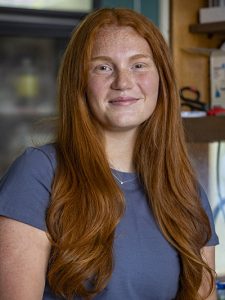Carolina is a research powerhouse. We make discoveries every day that transform and save lives. The University’s mission to educate comes alive through research experiences for our undergraduate students.
Undergraduate research experiences are a pivotal element of Carolina’s research mission and enterprise, affording our students valuable opportunities to address intricate questions and navigate unforeseen challenges. Students learn to analyze data, formulate solutions, and adapt to changing circumstances, honing valuable skills applicable to any future career. From writing research papers to presenting findings, students learn to communicate effectively in various formats and to diverse audiences. This enhances communication skills, crucial for success in all fields. Students also gain proficiency in specific software, data analysis tools, or laboratory techniques. These technical skills can significantly enhance their employability and open doors to specialized career paths.
As a parent of a college senior and a recent college graduate, I know how important participating in research has been for both of my children. Like many of our students, those opportunities (one focused in STEM and the other in humanities) have been among the highlights of their college careers and were certainly their most important academic experiences.
Engaging in research alongside the world’s top faculty researchers is an opportunity unlike any other — and on Carolina’s collaborative campus, these experiences are truly transforming students’ lives. With the IDEAs in Action general education curriculum, all undergraduate students are required to engage in research. This curriculum affords the opportunity to engage in hands-on, experiential learning and insight into the wonderful world of research through Research & Discovery courses. These courses are designed to bring our students into focused research alongside faculty for an immersive experience that allows students to produce original scholarship or creative work. In doing so students “reflect upon, deepen, and connect knowledge and capacities,” as described on the IDEAS in Action website.
In the academic year 2022-23, 6,890 students were enrolled in Research & Discovery courses for research credits — a 9.5% growth in those courses from Fall 2022 to Fall 2023. The Office of Undergraduate Research (OUR) breaks down this impressive number as such:
- Enrollment in faculty mentored independent research: 1,014
- Enrollment in lab courses that met R&D requirements: 838
- Enrollment in other lecture courses that had a significant research component/met R&D requirements: 4,341
- Enrollment of Senior Honors Thesis courses: 697
In addition, OUR reports that 399 students (8.2% of graduates) engaged in research as part of their honor’s thesis. Since these numbers only represent coursework, students who conduct research for pay, work-study, or as volunteers are not captured. But we quantify and track students engaged in sponsored research projects (i.e., research funded by an external organization, such as federal, state, private organization, or entity) through research databases managed by the Office of the Vice Chancellor for Research. According to our metrics, 754 students have been engaged in sponsored research over the last six months.
When faculty members are awarded competitive research grants from federal, private, or other sources, they bring funding to Carolina that provides data, support, and access that benefits our undergraduate students. Most importantly, engaging in hands-on research keeps students engaged and excited to explore, discover, and push boundaries. Student researchers are passionate about making advancements in their fields, and these experiential opportunities create highly trained professionals who give back to the state and beyond by making the world a better place.
Below are a few illustrative examples of the amazing work that our undergraduate students take part in with their faculty mentors:

“I enjoyed being able to work in different areas and to get a better understanding and appreciation of all the things that go into a big study like this.”
Junior Sara Ahmed worked with the Carolina Population Center’s Dynamics of Extreme Events, People, and Places (DEEPP) project during her summer internship in 2023. With a major in biostatistics, she helped the DEEPP team assess the short- and long-term impacts of storms in North Carolina by improving the study’s youth questionnaire, writing new questions that were more relevant for teenage study participants.
“The way I was able to volunteer at events and network with those already in the field helped me realize that this is where I’m meant to be.”
Senior Alex Acosta is an environmental health sciences major and a student ambassador for the Bachelor of Science in Public Health (BSPH) program at the UNC Gillings School of Global Public Health. In the summer of 2022, he received funding through the Carolina Covenant Career Accelerator Program to investigate ways to improve psychiatric patient transport and EMS responses to pediatric calls. He now feels called to work in the medical field, applying his training in public health to improve the lives of underserved North Carolinians.
“From my research, I have developed passions for understanding microplastics exposures and overall maternal and child health. These research experiences also helped me apply my interests in several classes and find amazing internships!”
Senior Sarah Kirsh is majoring in environmental health sciences and biology. Her research focuses on the potential harm that microplastics in the environment may have on pregnant women and their babies in North Carolina. Working with Department Chair Rebecca Fry, she is also performing basic science research to understand the potential toxic impacts of microplastics on moms and babies and will publish this work to increase scientific knowledge on the topic. She hopes to pursue a PhD in environmental sciences.

“I can’t count the number of times I’ve been overwhelmed by the flood of advice and proposed future experiments that were given purely out of the love for science.”
Senior Lilly Papell is a senior majoring in biology and minoring in chemistry and creative writing within the UNC College of Arts and Sciences. She studies how genome organization within microscopic animals called tardigrades plays a role in how they survive DNA-damaging environments that would kill most lifeforms. She conducts research with the Goldstein Lab and recently began a research forensic science internship at RTI International.
“This project gave me the courage I needed to realize that research is exactly where my heart lies, and gave me the confidence to know that I could do it.”
The Department of Applied Physical Sciences within the College offers a minor that trains students to utilize an engineering mindset to address societal problems. In one of Professor Ronit Freeman’s classes, students form convergent teams representing different majors and work together to advance a new technology to a proof-of-concept phase, including pitching it “Shark Tank”-style. In the Freeman Lab, first-year student Emma Hansen created a functional, pollution-free light bulb using luciferase, the bioluminescent enzyme that allows fireflies to glow.
“In the future, I aim to focus my efforts at the intersection of the laboratory and the clinic to further understand and better treat the devastating conditions I see in patients.”
Junior Abby Lehr is an undergraduate researcher in the Weeks and Laederach labs, studying the underlying biochemistry and molecular biology of human diseases. She is majoring in chemistry and biology within the College and was the Institute for Convergent Science’s (ICS) inaugural AGIEL (Advance Great Inventions or Leave Early) Summer Undergraduate Student in 2023. During her summer research with ICS, she worked on exploring small molecule binding and functioning, with the greater goal of creating new and improved therapeutics.

“I have enjoyed the opportunity to engage in interdisciplinary collaboration with a variety of researchers in fields ranging from nutrition to bioinformatics to epidemiology.”
One of my own undergraduate students, Aditya Shetye, received his BSPH in nutrition in May 2023. He stayed at Carolina for the Department of Nutrition’s dual degree program and will receive his Master of Science degree in May of 2024. Aditya leveraged his undergraduate research into a formal master’s thesis and will publish his results in a peer reviewed journal. This has been a wonderful and efficient opportunity for Aditya to further his career. Aditya’s research applies precision nutrition techniques to uncover associations between diet and cardiometabolic disease. Along the way, he has developed highly marketable, high-level technical skills in statistical programming and analysis.
The substantial investment in undergraduate education, our students, and the lasting impact they’ll have on Carolina’s legacy comes from research funding procured by our distinguished faculty. This funding includes contributions from federal, private, and various other sources. Research experience provides undergraduate students with invaluable skills, hands-on training, and a competitive edge for their academic and future professional pursuits. There is no better preparation for the post-grad years and entry into the workforce than working hands-on with a team to achieve a significant goal. That these teams are led by world experts in cancer, infectious disease, engineering, humanities, and more offers an experience that is uniquely Carolina.
